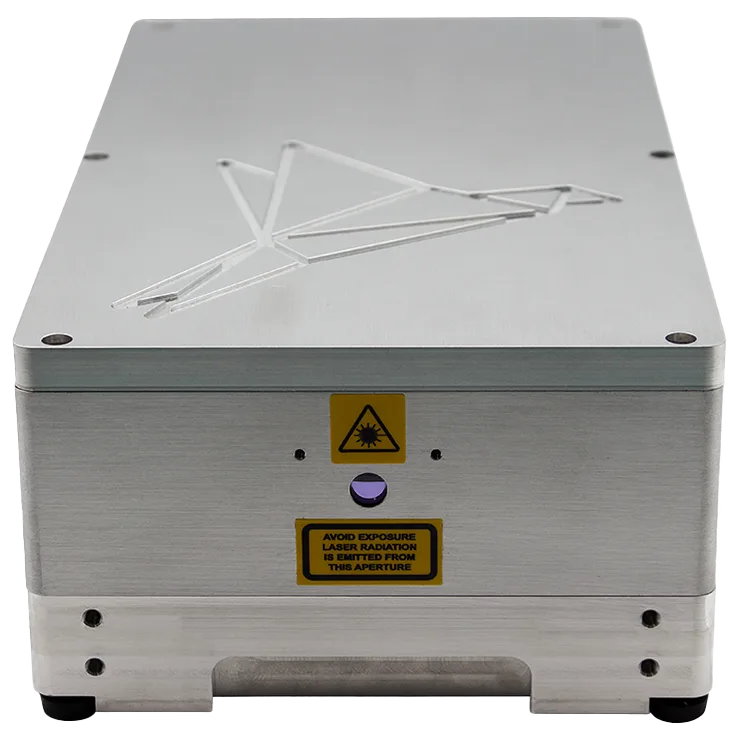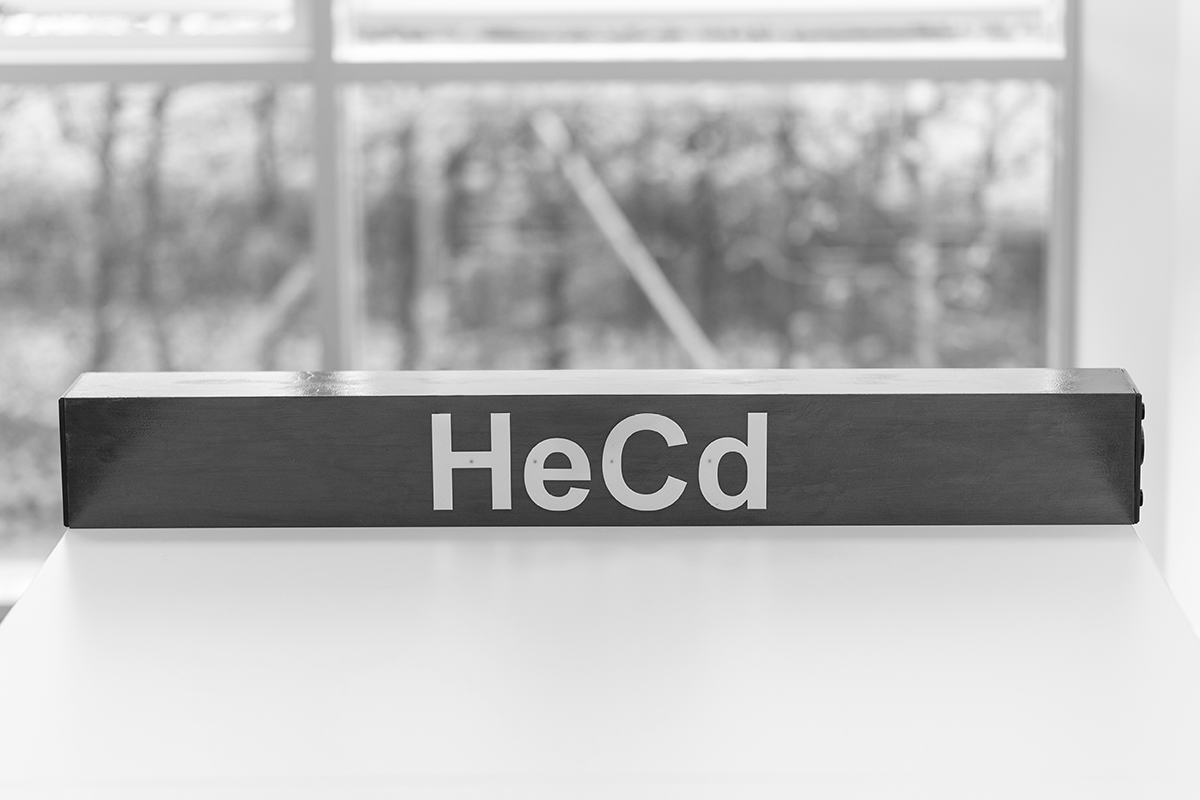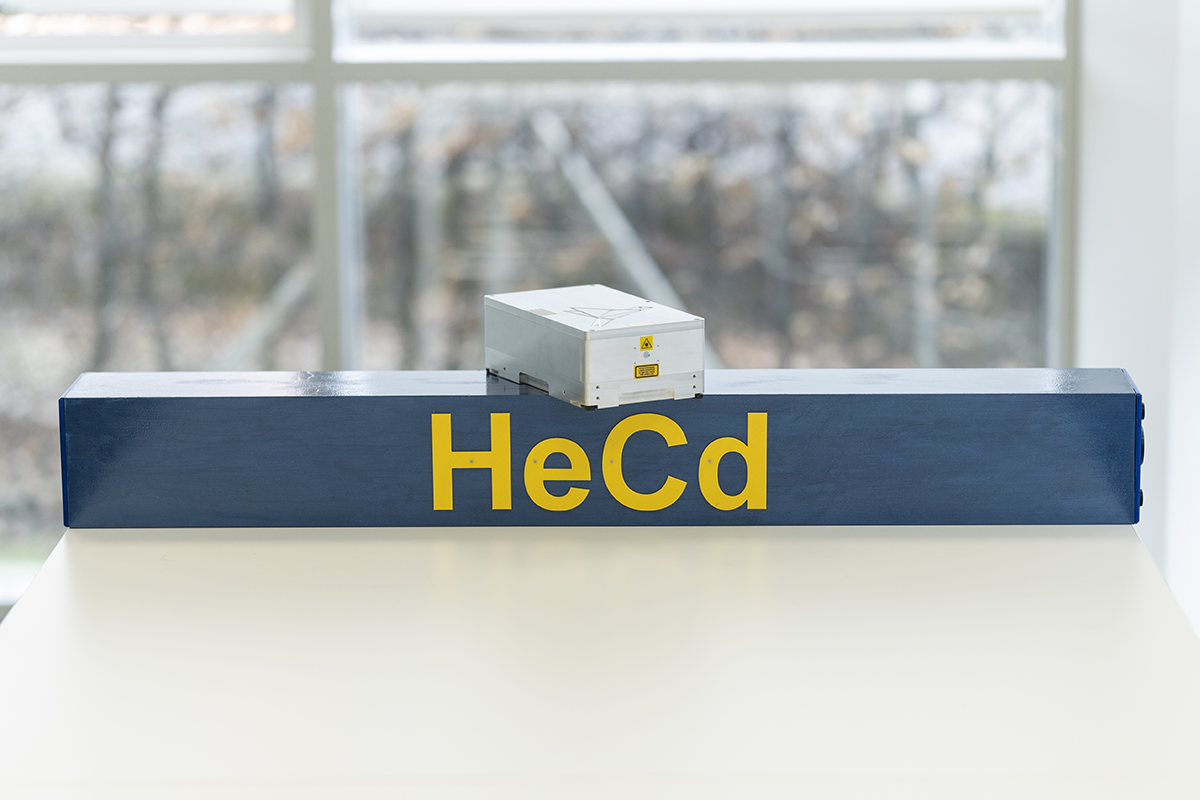320 nm
SKYLARK 320 NX
320 nm single frequency diode-pumped solid-state laser delivering the highest ultraviolet power from a compact footprint.

High power
200 mW
Delivers up to 200 mW of efficient ultraviolet light at 320 nm, ensuring ample power margin for complex setups.
Clean beam
M² ≤ 1.2
Stable output
± 0.2 pm
Maintains ± 0.2 pm wavelength stability over 10s of hours, ensuring spectral integrity for demanding tasks.
APPLICATIONS
Spectrally pure ultraviolet laser delivering scalable, high power for industrial applications
Optical characterisation
Our lasers deliver high power ultraviolet light to enable uniform, high-resolution imaging with low noise. Narrow intrinsic linewidth ensures accurate detection of fine details for improved quality control in production environments.
The Skylark NX series of lasers illuminate inspection applications such as:
- Raman spectroscopy (UV Raman)
- Photoluminescence (PL)
- UV fluorescence
- UV optical manipulation
Process and fabrication
High-power, single frequency DPSS lasers with superior spectral purity deliver precision and consistency, enabling detailed patterning over large areas without compromising quality.
The Skylark NX series of lasers power applications such as:
- Laser interference lithography
- Optical grating mastering and fabrication
- Precision optics manufacturing
- Interferometry
- Wafer inspection
Inspection and metrology
With ultra-stable output and ultra-narrow linewidth, single frequency DPSS lasers enable precise data collection and measurement for advanced research and industrial applications such as:
- Semiconductor metrology and inspection
- Semiconductor inspection
- 2D materials characterisation
- Wide bandgap semiconductors materials
- UV flow cytometry
“It’s taken 15 years to find a suitable replacement for our HeCd laser. The Skylark 320 NX DPSS laser has a clean mode without filters.”
Skylark 320 NX CW DPSS laser
The Skylark 320 NX CW DPSS laser provides ultra-stable single frequency UV light at 320 nm for demanding and emerging applications.
Engineered for consistent long-term performance, delivering up to 200 mW of ultra-stable output, low noise, and spectral purity.
Key specifications
Wavelength
320 nm
Output power
up to 200 mW
Spectral bandwidth
≤ 500 kHz
Beam quality
M² ≤ 1.2
Spatial mode
TEM₀₀
Operational mode
CW, SLM
Beam parameters
Beam height
59.0 mm
Beam diameter
1.0 - 1.5 mm
Beam divergence
≤ 1.0 mrad, diffraction limited
Beam pointing stability
≤ 5 μrad/°C
Coherence length
> 100 m
Polarisation ratio
≥ 200:1, vertical
Laser performance
Spectral stability (8 hours)
± 0.2 pm
Output power stability (8 hours)
≤ 2.0 % Peak to Peak
Output power noise (10 Hz - 10 MHz)
≤ 0.3% RMS
Warm up time
5 - 30 mins
Power consumption (typical)
< 50 W
Operating conditions
Ambient temperature
18 - 30 °C
Laser interface stability
± 1.5 °C
Storage
0 - 50 °C
Humidity
5 - 95 %, non-condensing
Laser dimensions
Laser head (L x W x H)
325 x 200 x 90 mm
Controller (L x W x H)
150 x 176 x 61 mm
HeCd gas laser vs. DPSS laser
Looking to replace your helium cadmium laser with an efficient, high power DPSS laser alternative?
Benefit from up to 4x more usable power, stable and reliable output, and a high quality beam without mode cleaning.
The Skylark 320 NX is designed to replace HeCd lasers in applications across:
- Laser interference lithography
- UV Raman spectroscopy
- Photoluminescence


Upgrade your UV workhorse
Helium Cadmium (HeCd) lasers have long served the demand for ultraviolet wavelengths at 325 nm — but are now outclassed by a diode-pumped solid-state laser alternative.
Upgrading from a 325 nm HeCd to a 320 nm Skylark NX DPSS laser offers four times more power, improved stability, lower maintenance, and a cleaner spectral performance within a compact, solid-state laser platform that is ready for integration into both research and industrial environments. Discover 6 reasons to consider replacing your HeCd system with a DPSS laser on our blog.
Four times more usable power
The Skylark NX 320 nm DPSS laser delivers up to four times the output power of a typical 325 nm HeCd system.
Higher power translates to shorter processing times, higher throughput, and improved signal strength in UV-sensitive materials and processes.
Long term stability
HeCd lasers are prone to power drift and thermal instability, which can affect repeatability and accuracy in precision applications.
The Skylark 320 NX offers wavelength stability of ± 0.2 pm and power stability within ± 2% over 10s of hours, maintaining consistent illumination and spectral performance over extended operation.
Spectral purity
The Skylark NX laser operates in a single frequency, TEM₀₀ mode with M² ≤ 1.2, delivering a clean Gaussian beam and ultra-narrow linewidth: < 1 GHz vs. < 0.00005 GHz.
This produces stable interference fringes, uniform illumination, and excellent spatial coherence, improving feature uniformity in lithography and data quality in spectroscopy.
Low maintenance, compact design
DPSS lasers often have a longer lifetime and double the maintenance interval of gas lasers, significantly reducing downtime and operational disruption. Paired with long-term stability, DPSS lasers also offer increased reliability that makes them ideal for industrial customers seeking to reduce time and resources spent on reactive maintenance.